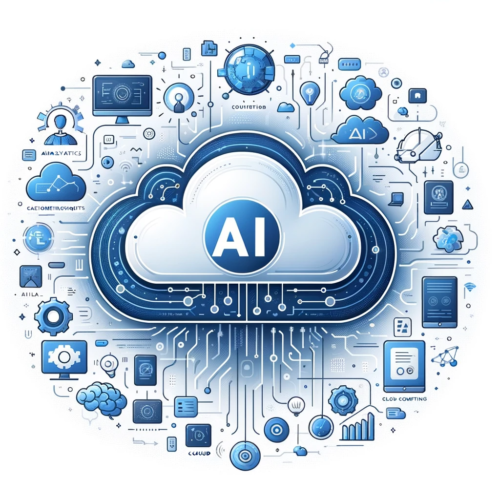Introduction
As we journey through the digital age, the evolution of technology continually reshapes the landscape of business and innovation. One of the most significant shifts in recent years has been the transition from on-premises software to cloud-based solutions. This move not only revolutionized data accessibility and storage but also paved the way for a more agile and scalable approach to business operations. Today, we’re at the cusp of another transformative phase – the integration of Artificial Intelligence (AI) into cloud software. This blog post is tailored for product managers who are navigating this new terrain, where AI is not just an add-on but a core component driving product excellence and meeting customer expectations.
The AI Advantage in Cloud Software
The incorporation of AI into cloud software represents a leap forward in digital capabilities. AI algorithms offer unparalleled insights, automate complex processes, and enhance decision-making, all of which are integral to a product manager’s toolkit. The ability to analyze vast amounts of data in real-time and predict trends can significantly improve product planning and execution. AI-driven tools can anticipate customer needs, tailor user experiences, and optimize product features, ensuring that businesses stay ahead of the curve.

Enhancing Product Value with AI
For product managers, the AI integration offers a unique opportunity to add value to their products. AI can be utilized to personalize user experiences, improve product usability, and streamline customer service. Features like predictive analytics, machine learning-driven recommendations, and automated customer support can transform a standard product into a cutting-edge solution that resonates with modern consumers.
Meeting Customer Requirements
In today’s market, meeting customer requirements isn’t just about delivering a product; it’s about delivering an experience. AI enables product managers to gain deeper insights into customer behavior and preferences. This understanding can be used to develop products that are not only functionally superior but also align perfectly with customer expectations. By leveraging AI, product managers can ensure that their products are not just relevant, but also ahead of their time.
Challenges and Considerations
While the benefits of AI are immense, product managers must also navigate the associated challenges. These include ensuring data privacy, managing ethical considerations around AI, and maintaining a balance between automation and human touch. Additionally, there is a need for continuous learning and adaptation as AI technologies evolve rapidly.
Expanding on the idea that AI is the next phase of digital transformation, especially in the context of product management, we can delve into specific areas where AI is making a significant impact:
- Enhanced Customer InsightsAI’s ability to process and analyze large datasets enables product managers to understand customer behavior and preferences at an unprecedented level. Tools like sentiment analysis and predictive modeling can forecast customer needs, allowing for more targeted product development.
- Automated and Personalized User ExperienceAI algorithms can personalize user experiences in real-time. From e-commerce recommendations to personalized content streams, AI makes products more adaptive and responsive to individual user needs.
- Optimized Product Development CyclesAI can significantly reduce the time and resources needed for product development. By automating routine tasks and providing predictive analytics, AI allows for faster iterations, testing, and refinement of products.
- Proactive Customer SupportAI-driven chatbots and virtual assistants can provide instant support to customers, resolving issues promptly and improving overall customer satisfaction. This not only enhances the product experience but also frees up human resources for more complex tasks.
- Predictive Maintenance in IoT ProductsFor products within the Internet of Things (IoT) sphere, AI enables predictive maintenance, identifying potential issues before they occur and reducing downtime.
- Data-Driven Decision MakingAI provides product managers with actionable insights based on data, rather than intuition. This leads to more informed decision-making, enhancing product strategy and execution.
- Ethical AI and Trustworthy ProductsAs awareness about AI ethics grows, there is an increasing demand for transparent and ethical AI. Product managers focusing on ethical AI can create more trustworthy and socially responsible products.
- Sustainability and AIAI can also be used to make products more environmentally friendly, by optimizing resource use and reducing waste in the production process.

Proof that AI is Driving Digital Transformation
- Market Growth: The AI market is expected to grow significantly, indicating widespread adoption across industries.
- Investment in AI Startups: There’s a surge in funding for AI startups, suggesting confidence in AI’s potential.
- Major Tech Players Investing in AI: Companies like Google, Amazon, and Microsoft are heavily investing in AI, integrating it into their products and services.
- Success Stories: Many companies have reported improved efficiency, cost savings, and increased customer satisfaction after implementing AI in their products.
AI is not just a technological trend, but a transformative force that is reshaping how products are created, delivered, and experienced. For product managers, understanding and leveraging AI is crucial in this new phase of digital evolution.
Conclusion
The integration of AI into cloud software marks a new era in digital transformation. For product managers, this phase is more than just a technological upgrade – it’s a paradigm shift in how products are designed, developed, and delivered. By embracing AI, product managers can drive innovation, create more value, and deliver solutions that truly meet the dynamic needs of customers. In this exciting new era, the potential for growth and transformation is limitless.